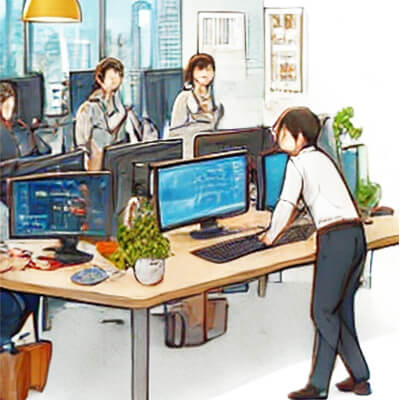Japanese Corporate Culture
Collectivism and Teamwork

In Japanese companies, there is a strong emphasis on collectivism, with a tendency to value the success of the team over individual achievements.
Employees have a strong sense of being part of the company and are expected to work collaboratively.
Because teamwork is prioritized, cooperation and harmony with others are valued more than individual performance.
As a result, decision-making processes are often carried out through consensus, rather than being driven by a single leader.
Seniority and lifetime employment

Many companies still have a strong seniority-based system, where seniority is prioritized over ability, and promotions and salaries are often determined based on length of service.
Lifetime employment is one of the traditional characteristics of Japanese companies, where employees are expected to work at one company for a long period of time.
This is especially common in large companies, but in recent years, due to globalization and changes in the economy, some aspects of this are gradually changing.
Emphasis on Harmony in Culture

The concept of valuing harmony (maintaining peace) is emphasized, so employees are expected to avoid conflicts with colleagues or superiors and work cooperatively.
There is also the business practice of "Hōrensō" (reporting, contacting, and consulting), which stresses the importance of sharing information appropriately with supervisors and colleagues.
Custom of Long Working Hours

In many Japanese companies, long working hours have become ingrained in the culture.
It is sometimes taken for granted that employees work overtime beyond regular hours, as an unspoken rule to show their "effort" and commitment.
In recent years, there has been a movement for work style reforms promoted by the government and companies, including reducing overtime hours and encouraging more flexible working practices.
Working Hours
Standard Working Hours

According to Japanese labor law, 8 hours per day and 40 hours per week are the legal working hours.
However, in many companies, working beyond these hours has become the norm, and long working hours, especially during busy periods, are common.
Overtime (Extra Hours)

Overtime (extra hours) is common in Japanese companies.
In many companies, employees are expected to work beyond regular hours depending on the workload.
Work Style Reform

In recent years, the Japanese government has been promoting "Work Style Reform" to prevent overwork-related deaths, limit working hours, and encourage flexible work styles such as telecommuting and flextime.
Some companies are working on reducing working hours and improving employees' work-life balance.
Leave System
Paid Leave

By law, paid leave is granted to employees who have worked continuously for more than 6 months.
The number of days granted increases according to the length of service, with a minimum of 10 days available annually.
However, in reality, there is a culture in many companies where taking paid leave is difficult, and the leave uptake rate is low.
Some employees are reluctant to take time off due to the fear of inconveniencing others.
Public Holidays and Long Vacations

There are about 15 public holidays a year in Japan, and it is common for companies to give employees time off on these holidays.
Obon and New Year's holidays are times when many companies shut down entirely, providing opportunities for extended breaks.
Especially during Obon (mid-August) and New Year's (late December to early January), these are the typical long vacation periods in Japanese companies.
Parental Leave and Caregiver Leave

In Japan, there are systems in place to support childbirth and child-rearing, such as parental leave and caregiver leave for family care.
Parental leave can be taken by both men and women and is available until the child turns one (or up to two years in certain circumstances).
Recently, there has been a push to promote paternity leave for men, but the actual take-up rate is still low.
Employee Benefits
Japanese companies often provide unique employee benefits in addition to statutory welfare, offering various support systems to help employees' lives.
Statutory Welfare
In Japan, companies are obligated to provide several statutory welfare benefits to employees. These include the following:
Company-Specific Welfare
Many companies offer their own welfare plans in addition to statutory benefits.
Here are some examples:
- Japanese companies are characterized by a corporate culture that emphasizes teamwork and collectivism, with seniority-based systems and lifetime employment still deeply rooted in many companies.
- Working hours tend to be long, but reforms in work styles are gradually improving the situation.
- Vacation systems and employee benefits are well-developed, but there is still room for improvement in how vacations are utilized, as the rate of paid leave usage is low.
- Employee benefits include not only statutory ones but also company-specific benefits, providing extensive support for employees' lives.



